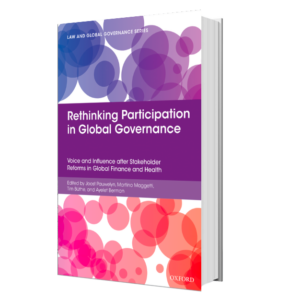Joost Pauwelyn, Martino Maggetti, Tim Büthe & Ayelet Berman (eds.)

With the growing importance of global governance, scholars, policy-makers, and other observers started to pay more attention to such ‘stakeholders’, which have traditionally been excluded from—or been marginalized within—policy- and decision- making processes. One key issue driving this trend has been the observation that more inclusive governance, while in the short term sometimes less efficient as a way of reaching a decision, can be much more effective because it will be based on better information and might have stronger support among stakeholders who are subsequently called upon to implement the decision. Moreover, expectations regarding the legitimacy of global governance have shifted from the traditional focus on state consent in intergovernmental IOs towards more democratic, participatory forms of legitimation. Allowing those who will be affected by a given rule or decision to participate in the process of rule-making or decision-making is foundational not just for political democracy. It is also essential for ‘economic democracy’, which contributes to the expectation that global governance bodies, too, should provide some practicable form of such participation—even if it might not go as far as Held’s proposal for ‘cosmopolitan democracy’. In light of such changed norms and expectations, the marginalization and exclusion of stakeholders also undermines the legitimacy of global governance bodies.
Against this background, many global bodies have in recent years reformed decision-making procedures and practices to boost stakeholder participation. They have established a variety of institutional opportunities for developing countries and non-state actors, which had hitherto been excluded from their decision-making processes, to have a voice in such processes. But have these reforms increased the actual engagement of previously excluded stakeholders? Have the reforms increased their influence in the decision and rule-making processes?
This volume aims to examine and explain to what extent such institutional reforms have given voice to previously excluded stakeholders (which motivates our focus on actual engagement, that is, the extent to which such stakeholders have made use of the new voice opportunities) and to what extent they have gained actual influence over outcomes thanks to these opportunities. Normative arguments as to why global bodies should open up to traditionally marginalized stakeholders motivate our inquiry, but we mainly seek to make an empirical and analytical contribution to the understanding of stakeholder participation.
Table of Contents
PART I: INTRODUCTION AND THEORETICAL FRAMEWORK
1. Introduction: Rethinking Stakeholder Participation in Global Governance, Ayelet Berman, Tim Büthe, Martino Maggetti, and Joost Pauwelyn
2. Voice and Influence in Global Governance: An Analytical Framework, Mercy Berman DeMenno and Tim Büthe
3. Analysing the Consequences of Institutional Reforms Using Country Pairs: A Note on the (Coarsened Exact) Matched-Country-Pairs Methodology of the Rethinking Stakeholder Participation Project, Tim Büthe and Cindy Cheng
PART II: INSTITUTIONS AND REFORMS IN GLOBAL FINANCE GOVERNANCE
Section A. Mapping the Reforms
4. Stakeholder Participation Reforms in Global Finance Governance, Olga Kovarzina and Martino Maggetti
5. Global Financial Governance and Banking Regulation: Redesigning Regulation to Promote Stakeholder Interests, Kern Alexander
Section B. Developing Countries’ Participation in Comparison
6. Brazil and Argentina in Global Finance Governance, Henrique Choer Moraes and Facundo Pérez Aznar
7. China and Vietnam in Global Finance Governance, Weiwei Zhang
8. India and Bangladesh in Global Finance Governance: From Structural Conflict to Embedded Liberalism in the Climate Finance Regime, Rahul Mukherji and Himanshu Jha
Section C. Consequences of and Responses to the Reforms
9. Assessing Stakeholder Participation Reforms in Global Finance Governance, Martino Maggetti and Olga Kovarzina
10. On Expanding the Theory of Stakeholder Participation, Christopher J Brummer
11. Comparing Formal and Informal Bodies in International Finance: A Policy-Making Perspective, Ronald Gindrat and Paul Inderbinen
12. Can Regional Institutions Increase the Legitimacy of Global Governance? The Cases of the Regional Branches of the FATF and of the FSB, Henrique Choer Moraes
PART III: INSTITUTIONS AND REFORMS IN GLOBAL HEALTH GOVERNANCE
Section A. Mapping the Reforms
13. Stakeholder Participation Reforms in Global Health Governance, Ayelet Berman
14. Global Health Governance and Stakeholder Participation, David Gartner
Section B. Developing Countries’ Participation in Comparison
15. Brazil and Argentina in Global Health Governance, André de Mello e Souza and Facundo Pérez Aznar
16. China and Vietnam in Global Health Governance, Cindy Cheng and Anh Do
17. India and the Philippines in Global Health Governance, Tim Büthe, Sachin Chaturvedi, Peter B Payoyo, and Krishna Ravi Srinivas
Section C. Consequences of and Responses to the Reforms
18. Assessing Stakeholder Participation Reforms in Global Health Governance, Ayelet Berman and Joost Pauwelyn
19. The Effects of Stakeholder Reforms on Global Health Governance: A Response, Gian Luca Burci
20. How Much Do Health Actors from the Global South Influence Global Health Governance? A Response, Suerie Moon
21. Evolving Norms and Objectives Regarding Stakeholder Participation: The Global Fund to Fight AIDS, Tuberculosis and Malaria, Gülen Atay Newton
22. The World Health Organization’s Engagement with Non-State Actors: The Risk of Corporate Influence, K M Gopakumar
PART IV: STAKEHOLDER PARTICIPATION IN GLOBAL GOVERNANCE: CROSS-CUTTING ISSUES
23. The Stakeholder Participation Triangle: Trusteeship, Functionality, and Efficiency, Ayelet Berman
24. Public Power and Private Stakeholders, Kal Raustiala
25. Conclusion: The Participation of Marginalized Stakeholders in Global Governance, Tim Büthe, Joost Pauwelyn, Martino Maggetti, and Ayelet Berman





